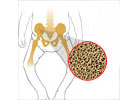A new study shows that cells exposed to high doses of iron are more responsive to infection. Iron is vital for the binding and release of oxygen by
A new study shows that cells exposed to high doses of iron are more responsive to infection. Iron is vital for the binding and release of oxygen by red blood cells and iron deficiency is a relatively common health problem especially in younger women and older people with a poor diet. That is why many breakfast cereals are now fortified with iron, to make sure everyone gets enough of this important mineral.
But too much iron might be as bad for you as too little, say researchers at Ohio State University. They exposed human intestinal cells, in test tubes, to iron concentrations resembling those in food supplements. It is a reasonable model of what goes on in the body, for these cells take up iron from food and transport it into the bloodstream.The experiments show that when such cells are exposed to iron, they become more susceptible to infection by the common food poisoning bacterium Salmonella enteritidis . The researchers suggest that iron supplements and fortified foods should only be consumed by those with proven iron deficiency. Those in good health have no need of them and, indeed, may be putting themselves at risk if they use them to guarantee an iron intake that is already adequate.









